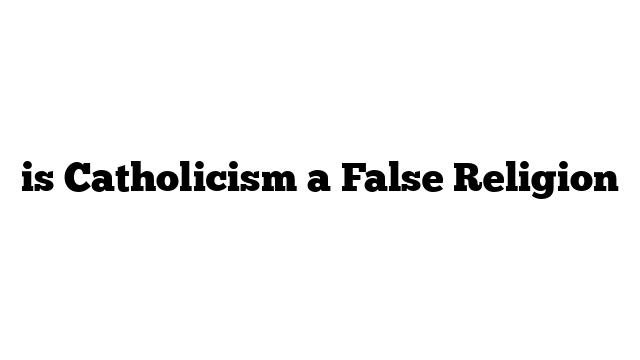Miscellaneous
Understanding Catholicism: A Religion of Faith and Tradition
Introduction
Catholicism is one of the oldest and largest Christian denominations in the world, with over 1.3 billion followers globally. However, like any major religion, it has faced its fair share of criticism and skepticism. Some individuals question the validity and authenticity of Catholicism, leading to debates and discussions about its status as a true religion. In this article, we will explore the foundations of Catholicism, its beliefs, and address the notion of whether it can be considered a false religion.
The Origins of Catholicism
Catholicism traces its roots back to the time of Jesus Christ and his apostles. The term “catholic” is derived from the Greek word “katholikos,” meaning “universal.” The early Christian community developed a distinctive form of worship centered around the Eucharist, with rituals, sacraments, and a hierarchical structure.
The central figure of Catholicism is Jesus Christ, whom Catholics believe to be the Son of God and the Savior of humanity. The teachings of Jesus, as recorded in the Gospels, form the foundation of Catholic doctrine, emphasizing love, compassion, forgiveness, and the pursuit of righteousness.
Essential Beliefs in Catholicism
1. The Holy Trinity: Catholics believe in the Holy Trinity, which consists of God the Father, God the Son (Jesus Christ), and God the Holy Spirit. They understand God as one divine being in three distinct persons.
2. The Sacraments: Catholics place great importance on the seven sacraments, which are considered sacred signs that convey God’s grace. These sacraments include baptism, confirmation, Eucharist, reconciliation, anointing of the sick, holy matrimony, and holy orders.
3. The Holy Scriptures and Tradition: Catholics believe in the authority of both the Bible and sacred tradition. The Bible is held as the inspired Word of God, while tradition represents the teachings and practices passed down through generations from the time of Jesus and the apostles.
4. The Saints and Mary: Catholics believe in the intercession of saints and honor the Virgin Mary as the Mother of Jesus. They seek the guidance and prayers of saints as they believe they are united with Christ in heaven.
Misconceptions about Catholicism
Criticism of Catholicism often arises from misconceptions and stereotypes. It is important to address a few common misconceptions and provide clarity:
1. Worship of Mary: Catholics do not worship Mary; they honor her as a revered figure in Christianity. They believe that Mary holds a special place in salvation history as the mother of Jesus.
2. Idolatry: The veneration of religious images, such as statues and icons, is a practice in Catholicism. However, Catholics make a clear distinction between worshipping these images and using them as aids for prayer and reflection.
3. Papal Infallibility: The doctrine of papal infallibility does not mean that the Pope is incapable of making mistakes in his personal life or opinions. It refers to the Pope’s ability to speak infallibly on matters of faith and morals when speaking “ex cathedra” (from the chair of Peter) on behalf of the whole Church.
Is Catholicism a False Religion?
The idea of Catholicism being a false religion is a subjective viewpoint held by certain individuals or groups. However, it is important to note that Catholicism has a long-established history, global presence, and millions of devoted followers who find spiritual guidance, strength, and fulfillment within its teachings.
Like any other religion, Catholicism is subject to differing interpretations and practices among its adherents. Nevertheless, the core values and beliefs of Catholicism align closely with the teachings of Jesus and the early Christian community. The focus on love, mercy, and the pursuit of holiness resonates with countless believers who find solace and meaning within the Catholic faith.
Conclusion
Catholicism is a rich and complex religious tradition that has shaped the lives of millions of people around the world for centuries. While there may be debates about certain aspects of the faith, categorizing it as a false religion oversimplifies the depth and diversity within Catholicism. Understanding the foundations, beliefs, and practices of Catholicism can foster a more informed and respectful dialogue among individuals of different faiths and worldviews.

